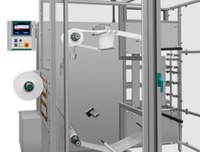
This is the outcome of the collaborative effort of the University of Bologna and Marchesini Group, who prototyped a new material that is more effective than the one currently used to produce individual protective equipment.
This prototype is a unique case in the industry and allows to produce a type of masks' filter which is more efficient than the one currently used for filtering out viruses and bacteria. A multidisciplinary research group of the University of Bologna in collaboration with Marchesini Group developed the prototype of this machine. Researchers are now fine-tuning the machine, which will soon be operative.
"This prototype allows for the industrial production of this innovative filter material, which is composed of highly electrostatic polymer nanofibers" explains Professor and project coordinator Andrea Zucchelli from the Department of Industrial Engineering of the University of Bologna. "This is a co-design project that we created with Marchesini Group. This company promptly answered the call for applications we launched within the Bologna area, and in less than two months produced the machine".
The machine prototype is now in the Industrial Engineering Lab in Bologna, and, once operative, it will produce filter material for approximately 7,000 masks per day. GVS (Zola Predosa) joined the project from its outset and will soon produce a prototype batch of FFP3 masks using the new filter material. GVS is a world-leading company in the supply of advance filters for highly critical applications and one of the world's biggest producers of individual protective equipment.
This extraordinary synergy began shortly after the outbreak of COVID-19 in Italy. Given the country's need for suitable protective equipment, a multidisciplinary research group of the University of Bologna started developing a filter material that was particularly effective in preventing contamination from viruses and bacteria. The research group is coordinated by professors Andrea Zucchelli (Department of Industrial Engineering), Maria Letizia Focarete (Department of Chemistry "Giacomo Ciamician") and Davide Fabiani (Department of Electrical, Electronic and Information Engineering "Guglielmo Marconi".
"University is the only place where such a multidisciplinary method, involving mechanical and electrical engineering as well as polymer design, could be put to work so efficiently and so rapidly to create this high-tech electrostatic spinning system", says Zucchelli. "This synergy allowed us to combine electro-spinning technology, that produces nanofibers, with the corona discharge, which is a phenomenon creating a high electrostatic charge in nanofibers".
"This project would have been impossible without the long-standing collaboration between Marchesini Group and the University of Bologna, which proved to be even more important during this period of hardship for the regional and national economic system", adds Maurizio Marchesini, president of Marchesini Group. "Alongside the mask connectors that we produced with 3D-printers, this prototype is further proof of how technology can be employed to address the needs of the community before and after the pandemic".
This new material presents some undeniable advantages: it can retain aerosols containing viruses and bacteria with more efficiency than current filter materials, its particulate matter is super-filtering and versatile. These characteristics make this new material apt not only for mask production but also for producing fabric of other types of equipment.
"We are deeply invested in the development and employment of innovative materials that can raise the safety and comfort levels of protective devices. Moreover, we wish to make such products available on the market for the end-user’s benefit", commented by Massimo Scagliarini, GVS' CEO. "By working with the University, GVS can exploit and expand its know-how in the field of filter materials, thus promoting positive synergies at the regional level and contributing to supplying with local sources the production lines of FFP3 masks, that GVS made in response to the pandemic".
Once the technology to produce these new nanofibers had been fine-tuned and properly tested, it was necessary to get to the production phase. Marchesini Group answered to Unibo research group's call for the production of the machine's necessary components. This made their already solid partnership even stronger. The research group and the company's technician started working together and, in a few weeks, a prototype of the machine was ready.
Once the machine set-up is over, this unique prototype will be made operative. Super efficient and highly protective FFP3 masks will be the first items to be produced with the nanofiber material. Researchers, however, are already working at some new ideas to extend the reach of this new technology.
